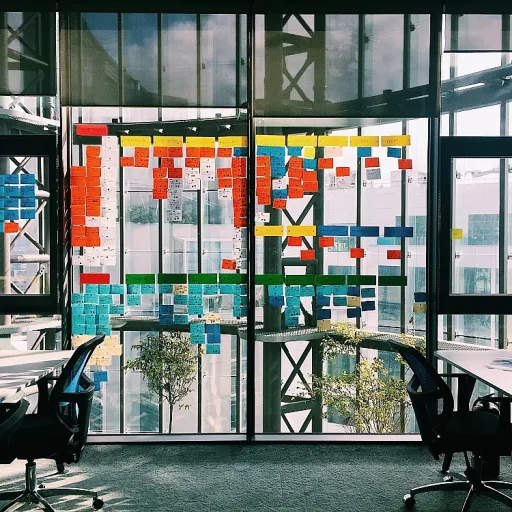
Understanding the Retail Landscape in the Arabian Emirates
The Vibrant Tapestry of Retail in the Arabian Emirates
The retail landscape in the Arabian Emirates is a dynamic tapestry, reflecting the region's unique cultural blend and economic vitality. With a burgeoning economy and a cosmopolitan clientele, retailers are constantly evolving to meet the changing demands of their customers. This thriving market offers a compelling canvas for retail projects, but it also presents distinct challenges that require adept project management. Retailers in the Emirates operate in a competitive market, where customer experience and satisfaction are paramount. Understanding the nuances of this landscape is crucial for successful project management. Retail projects must cater to a wide array of preferences, necessitating a keen insight into customer behavior and sales data trends. Inventory and supply chain processes are at the heart of this market, demanding precise management services to ensure seamless customer service. The interplay of numerous factors such as store design, resource allocation, and supply chain coordination highlights the importance of effective project management strategies. Projects often require a Gantt chart for planning and monitoring tasks, allowing project managers to oversee various team members and ensure efficient collaboration. In real-time, the ability to adapt to market demands and streamline processes becomes a pivotal factor in achieving success. In tackling the complexities of retail in the Emirates, project managers must leverage data-driven insights and prioritize customer-centric solutions. To deepen your understanding of how forecasting can be harnessed to achieve better outcomes in this vibrant retail landscape, explore more on forecasting methodology in project management, a tool that is invaluable for anticipating market shifts and aligning projects with the local consumer base.Key Challenges in Retail Chain Project Management
Overcoming the Hurdles of Effective Project Management
In the burgeoning retail landscape of the Arabian Emirates, retailers face numerous challenges in managing their projects. This dynamic market requires project managers to adeptly handle diverse tasks, ranging from inventory management to seamless store operations. One key challenge is maintaining efficiency in project timelines. With the fast-paced retail environment, the effective utilization of Gantt charts can be a game-changer, allowing project managers to visualize timelines and ensure tasks are on track. Another hurdle involves data management. Retailers generate vast amounts of sales data and supply chain information daily. Efficient handling of this data is crucial for improving inventory management and enhancing overall chain processes. Furthermore, retailers must navigate collaboration between multiple team members and departments. Building strong teams ensures that resources are allocated effectively, streamlining processes and minimizing delays in project completion. Retail chain management also contends with balancing customer experience and operational efficiency. Providing exceptional customer service while managing logistical tasks can be daunting, yet it is vital for customer satisfaction and loyalty. Addressing these challenges requires a strategic approach to project management. By implementing efficient systems, businesses can navigate these complexities and achieve success in their retail projects. For more insights on managing hierarchy in tasks, explore this detailed guide.Effective Strategies for Project Management
Optimizing Resource Allocation and Collaboration
In the dynamic retail market of the Arabian Emirates, managing projects efficiently requires keen attention to resource allocation and fostering collaboration among team members. Project managers in the region are tasked with aligning resources with project needs to guarantee customer satisfaction and enhance the overall retail experience.- Identifying and deploying the right resources at the right time helps minimize waste and maximize productivity, which is essential in meeting customer demands and maintaining competitiveness in the retail landscape.
- Effective project management hinges on facilitating real-time collaboration among diverse team members. This fosters seamless communication, ensuring that everyone is aligned and able to tackle challenges promptly.
Implementing Gantt Charts and Real-Time Data Sharing
- Employing tools like a gantt chart allows project managers to visualize timelines and better manage tasks across projects. This aids in anticipating supply chain challenges and coordinating efforts effectively.
- Leveraging sales data in real time provides insights that drive smarter decision-making. By accessing up-to-date data, retailers can refine their inventory management strategies and respond swiftly to market demands, ensuring a seamless customer experience.
Streamlining Inventory Management and Enhancing Customer Service
- To improve overall efficiency in retail projects, optimizing inventory management processes is vital. Implementing data-driven techniques provides a clearer picture of stock levels across stores, enabling prompt replenishment and reducing instances of stockouts or overstock.
- Customer service is at the heart of successful retail chains. Ensuring consistent, high-quality service requires an integrated approach to management services across the chain, from store operations to supply chain management. This holistic view supports elevated customer satisfaction and loyalty.
Leveraging Technology for Better Outcomes
Implementing Technological Solutions
In today's retail environment, leveraging technology is crucial for efficient project management and overcoming challenges. Effective project management in retail chains involves applying diverse technological tools to enhance every facet of operations, from inventory management to customer experience. Retailers can benefit from technologies such as real-time data analytics and inventory management systems, which allow project managers to have a clear overview of supply chain processes and resources. By employing real-time data analytics, project management teams can make informed decisions that drive customer satisfaction and improve store operations. This data-driven approach offers insights into sales data, helping in efficient resource allocation and timely completion of tasks across the chain.Online Collaboration Tools
Adaptation of online collaboration tools has also become indispensable. These tools enable seamless communication among team members, regardless of geographical barriers, thus fostering an environment conducive to collaboration. They empower the team to align on project goals efficiently, ensuring that all tasks are executed in harmony with the overall retail strategy. Additionally, Gantt charts play a vital role in visualizing project timelines and task dependencies. Through this visualization, retail project managers can better manage their teams and optimize time allocation to various projects, which ultimately leads to a smoother execution and a more responsive retail chain operation.Optimizing Customer Service Through Technology
Beyond the back-end processes, technology also enhances front-end customer interaction. Retailers can implement technologies that improve customer service and personalize the shopping experience. This leads to increased customer loyalty and higher sales. Utilizing these technological advancements, Arabian Emirates retail companies can push the boundaries of customer service, ensuring that the consumer journey is not only satisfying but memorable. These strategies help in crafting a differentiated and competitive market presence, aligning with the evolving retail landscape challenges.Case Studies of Successful Retail Projects
Illustrative Examples of Retail Success
In the dynamic retail landscape of the Arabian Emirates, several projects have set benchmarks for effective project management. These case studies highlight how strategic planning and technology integration can overcome challenges and enhance customer satisfaction.
Streamlining Inventory Management
One notable example involves a leading retailer that revamped its inventory management processes. By implementing real-time data analytics, the company was able to optimize its supply chain, reducing overstock and minimizing stockouts. This approach not only improved inventory accuracy but also enhanced the overall customer experience by ensuring product availability.
Enhancing Customer Experience Through Technology
Another successful project focused on leveraging technology to improve customer service. By integrating a customer relationship management (CRM) system, the retail chain was able to personalize customer interactions, leading to increased customer satisfaction and loyalty. This project underscored the importance of aligning technology with customer-centric strategies.
Efficient Resource Allocation
A third case study highlights the effective use of Gantt charts for resource allocation. By visualizing tasks and timelines, project managers were able to coordinate team efforts more efficiently, ensuring that all team members were aligned with project goals. This approach facilitated better collaboration and timely project completion, addressing one of the key challenges in retail chain management.
Collaboration and Team Dynamics
Successful retail projects often hinge on effective collaboration among team members. One project demonstrated how fostering a culture of open communication and teamwork can lead to innovative solutions and improved project outcomes. By encouraging team members to share insights and feedback, the company was able to adapt to market changes swiftly and effectively.
These case studies illustrate the potential of strategic project management in transforming retail operations. By addressing challenges head-on and leveraging technology, retailers in the Arabian Emirates can achieve significant improvements in both operational efficiency and customer satisfaction.
Future Trends in Retail Chain Management
Emerging Trends Shaping the Future
The retail landscape in the Arabian Emirates is evolving rapidly, driven by technological advancements and changing consumer expectations. As project managers navigate these shifts, understanding future trends is crucial for maintaining a competitive edge.
Data-Driven Decision Making
With the increasing availability of sales data and customer insights, retailers are leveraging data analytics to enhance inventory management and customer satisfaction. Real-time data allows project managers to make informed decisions, optimizing supply chain processes and improving overall efficiency.
Integration of Advanced Technologies
Technological integration is becoming a cornerstone of effective project management. Tools like Gantt charts and real-time collaboration platforms are streamlining tasks and improving team coordination. As technology continues to advance, project managers must stay updated to harness these tools effectively.
Focus on Customer Experience
Enhancing customer experience remains a top priority for retailers. By focusing on customer service and satisfaction, retail projects can drive loyalty and repeat business. Project managers are increasingly tasked with aligning project goals with customer expectations, ensuring a seamless shopping experience.
Sustainability and Ethical Practices
As consumers become more environmentally conscious, sustainability is gaining prominence in retail chain management. Projects that incorporate sustainable practices not only meet regulatory requirements but also resonate with eco-conscious customers, enhancing brand reputation.
Agility in Project Management
In a dynamic market, agility is key. Project managers are adopting flexible methodologies to quickly adapt to changes and challenges. This agility enables teams to respond to market demands efficiently, ensuring timely project completion and resource allocation.
By staying ahead of these trends, project managers in the Arabian Emirates can effectively navigate the complexities of retail chain management, ensuring successful project outcomes and sustained growth.













